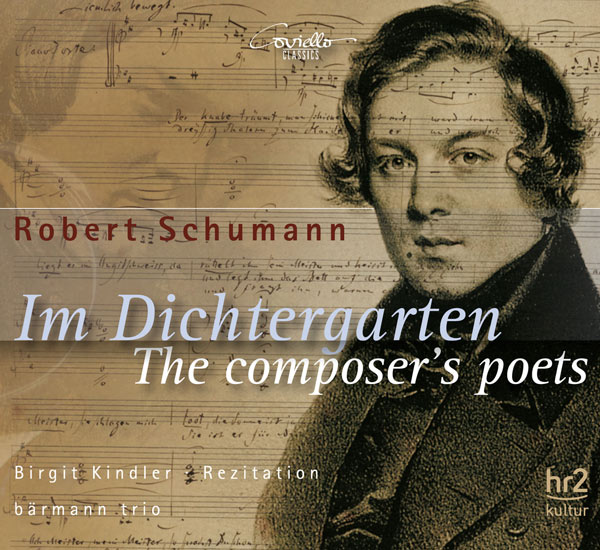
Robert Schumann
Birgit Kindler ⋅ recitation
Edition: Coviello Classics
Booklet: de / en
Media: CD / Download
COV 51007
bärmann trio
Sven van der Kuip · clarinet
Ulrich Büsing · basset horn
John-Noel Attard · piano
Ulrich Franck · double bass
Robert Schumann was equally fascinated by music and poetry – in his compendium Poet‘s Garden of Music, he collected world literature on the subject ofmusic which he considered important. The Bärmann Trio juxtaposes recitations of excerpts from this anthology with works that are particularly inspired by poetic associations, above all the melodramas, in which Schumann believed he had discovered a new art form combining poetry and music.
| 1. | E.T.A. Hoffmann: Wie ist doch die Musik | 1:15 |
| Robert Schumann: Studien für Pedalflügel op. 56 / arr. Ulrich Büsing | ||
| 2. | Nicht zu schnell | 1:55 |
| 3. | Mit innigem Ausdruck | 3:35 |
| 4. | Andantino | 1:41 |
| 5. | Innig | 3:25 |
| 6. | Nicht zu schnell | 2:05 |
| 7. | Adagio | 3:11 |
| 8. | Robert Schumann: Ballade „Schön Hedwig“ op. 106 | 5:31 |
| 9. | E.T.A. Hoffmann: Nicht sowohl im Träume | 0:57 |
| Robert Schumann: Impromptus op.66 / arr. Ulrich Büsing | ||
| 10. | Lebhaft | 3:47 |
| 11. | Nicht sehr schnell und gesangvoll zu spielen | 3:18 |
| 12. | Im Volkston | 2:16 |
| 13. | Nicht schnell | 2:37 |
| 14. | Lebhaft | 3:27 |
| 15. | Reuig, andächtig | 5:39 |
| 16. | Robert Schumann: Ballade „Die Flüchtlinge“ op. 122/2 | 3:13 |
| 17. | Jean Paul: Der Mensch ohne Poesie | 1:18 |
| Johannes Brahms: Variationen Es-Dur op. 23 / arr. Ulrich Büsing | ||
| 18. | Thema. Leise und innig | 1:50 |
| 19. | Variation I L’istesso Tempo. Andante molto moderato | 1:22 |
| 20. | Variation II | 1:28 |
| 21. | Variation III | 1:47 |
| 22. | Variation IV | 1:55 |
| 23. | Variation V | 1:19 |
| 24. | Variation VI Allegro non troppo | 1:21 |
| 25. | Variation VII Con moto. L’istesso tempo | 1:31 |
| 26. | Variation VIII Poco più vivo | 1:08 |
| 27. | Variation IX | 1:55 |
| 28. | Variation X Molto moderato, alla marcia | 3:19 |
| 29. | Robert Schumann: Ballade „Der Heideknabe” op. 122/1 | 5:23 |
| 30. | E.T.A. Hoffmann: Wenn die Töne sprechen | 1:28 |
| 31. | G.E. Lessing: Der Schäfer und die Nachtigall | 0:28 |
| Total time: | 1:15:47 | |

